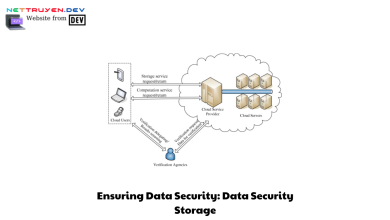Cloud-Based and Outsourced Data Management Platforms & Services: Enhancing Efficiency and Security

In today’s digital era, businesses are generating vast amounts of data that require efficient management and secure storage. This is where cloud-based and outsourced data management platforms & services come into play. But what exactly do these terms mean, and why are they crucial for businesses? Let’s delve into the world of cloud-based and outsourced data management to explore their significance.
Defining Cloud-Based and Outsourced Data Management Platforms & Services
Cloud-based data management platforms refer to solutions that store and manage data in virtual environments, making it accessible from anywhere with an internet connection. On the other hand, outsourced data management services involve entrusting the responsibility of data management to specialized third-party providers. These services can include data storage, backup, security, and analysis.
The Importance of Cloud-Based and Outsourced Data Management Platforms & Services
Efficiency is a key driver for businesses to adopt cloud-based and outsourced data management. With cloud-based platforms, you gain the ability to scale your data storage and processing capabilities effortlessly. As your business grows, these platforms can accommodate your expanding data needs without requiring substantial infrastructure investments.
Moreover, cloud-based solutions offer substantial cost savings. By eliminating the need for on-premises servers and maintenance, businesses can reduce their operational expenses significantly. Instead, they can subscribe to cloud-based data management platforms on a pay-as-you-go basis, optimizing costs based on their specific requirements.
Data security is another critical aspect addressed by these platforms and services. They offer robust security measures, including encryption, access controls, and regular backups, ensuring that your data remains protected from unauthorized access, loss, or system failures. By entrusting your data management to specialized providers, you can leverage their expertise in data security protocols and compliance with industry regulations.
In conclusion, cloud-based and outsourced data management platforms & services provide businesses with enhanced efficiency, cost savings, and data security. By leveraging these solutions, you can focus on your core operations while leaving the complexities of data management to the experts. In the following sections, we will explore the benefits, types, and best practices associated with these platforms and services. Stay tuned to uncover how cloud-based and outsourced data management can revolutionize your business operations!
Continue reading Benefits of Cloud-Based Data Management Platforms & Services…
Benefits of Cloud-Based Data Management Platforms & Services

In today’s data-driven world, businesses are constantly seeking ways to optimize their data management processes. Cloud-based data management platforms and services offer a multitude of benefits that can revolutionize how organizations handle their valuable data.
Increased Scalability and Flexibility
One of the key advantages of cloud-based data management platforms is their inherent scalability. Traditional on-premises data management systems often require significant investments in hardware and infrastructure to accommodate data growth. However, with cloud-based solutions, you can easily scale your storage and processing capabilities to match your evolving needs.
Cloud platforms provide the flexibility to expand or contract your data storage and processing capacity on-demand. Whether you experience sudden spikes in data volume or seasonal fluctuations, cloud-based solutions can seamlessly adjust to meet your requirements. This scalability ensures that you have the resources you need, precisely when you need them, without the hassle of upfront investments or resource wastage.
Cost Savings and Reduced Infrastructure Requirements
By adopting cloud-based data management platforms, businesses can enjoy substantial cost savings. Traditional on-premises data management systems involve significant upfront investments in hardware, software licenses, and maintenance. These costs can quickly escalate as data volumes grow. In contrast, cloud-based solutions operate on a subscription-based model, allowing you to pay for the resources you consume.
With cloud-based platforms, you eliminate the need for large-scale infrastructure investments. The responsibility of hardware maintenance, software upgrades, and security protocols falls on the cloud service provider, reducing your operational burden. This not only saves you money but also frees up resources that can be redirected towards other strategic initiatives.
Enhanced Data Security and Backup Capabilities
Data security is a paramount concern for businesses of all sizes. Cloud-based data management platforms offer robust security measures to protect your valuable data. These platforms employ advanced encryption techniques to safeguard data during transmission and storage, ensuring that only authorized individuals can access it.
In addition to encryption, cloud-based solutions provide reliable backup capabilities. Regular automated backups ensure that your data is protected from loss or corruption. With redundant storage systems and disaster recovery mechanisms in place, these platforms offer enhanced data resilience, minimizing the risk of data loss or downtime.
In conclusion, cloud-based data management platforms and services offer significant benefits such as increased scalability, cost savings, and enhanced data security. By leveraging these advantages, businesses can optimize their data management processes, streamline operations, and focus on their core competencies. In the subsequent sections, we will explore the various types of outsourced data management services and the features of cloud-based data management platforms. Keep reading to uncover the full potential of these solutions!
Continue reading Outsourced Data Management Services…
Outsourced Data Management Services

Outsourcing data management to specialized providers offers businesses a range of benefits and expertise that can significantly enhance their operations. Let’s delve into an overview of outsourced data management services, explore the advantages of outsourcing, and uncover the different types of services available.
Overview of Outsourced Data Management Services
Outsourced data management services involve entrusting the responsibility of handling and maintaining your data to external providers. These providers possess the infrastructure, technology, and expertise necessary to ensure efficient data management, allowing businesses to focus on their core competencies.
One of the primary aspects of outsourced data management services is data storage. Providers offer secure and scalable storage solutions, eliminating the need for businesses to invest in costly hardware and maintenance. Whether it’s structured or unstructured data, these services can accommodate various types of information.
Additionally, outsourced data management services often include data backup and recovery. By implementing robust backup strategies, providers ensure that your data remains protected from any potential loss or disruption. In the event of system failures or accidents, these services enable quick recovery and minimize downtime, ensuring business continuity.
Advantages of Outsourcing Data Management to Specialized Providers
-
Expertise and Specialized Knowledge: Outsourcing data management allows businesses to tap into the expertise of specialized providers who possess in-depth knowledge of data management practices, security protocols, and industry regulations. This ensures that your data is handled professionally and in compliance with relevant standards.
-
Cost Savings: Outsourcing data management eliminates the need for businesses to invest in expensive infrastructure, software licenses, and IT personnel. Instead, they can leverage the provider’s existing resources, paying for services on a subscription or usage basis. This significantly reduces operational costs and allows businesses to allocate their resources more effectively.
Different Types of Outsourced Data Management Services Available
-
Data Storage and Backup: Providers offer secure and scalable storage solutions, ensuring that your data is safely stored and easily retrievable. They also implement backup strategies to protect against data loss and facilitate rapid recovery.
-
Data Security and Compliance: Outsourced data management services include robust security measures such as encryption, access controls, and regular audits to safeguard your data and comply with industry regulations.
-
Data Analytics and Insights: Providers can offer advanced analytics capabilities to extract valuable insights from your data, enabling data-driven decision-making and enhancing business intelligence.
In conclusion, outsourced data management services provide businesses with expertise, cost savings, and access to specialized resources. By leveraging these services, businesses can ensure efficient data management, enhanced security, and focus on their core operations. In the upcoming sections, we will explore cloud-based data management platforms and their unique features. Stay tuned to discover how these platforms can revolutionize your data management strategy!
Continue reading Cloud-Based Data Management Platforms…
Cloud-Based Data Management Platforms
Cloud-based data management platforms offer businesses a comprehensive solution for storing, organizing, and analyzing their data in a virtual environment. Let’s explore the intricacies of these platforms and the array of features they provide.
Explanation of Cloud-Based Data Management Platforms
Cloud-based data management platforms utilize remote servers to store and manage data, eliminating the need for on-premises infrastructure. This allows businesses to access their data from any location with an internet connection, providing unparalleled flexibility and convenience. By leveraging cloud technology, these platforms offer scalable and reliable storage solutions that can accommodate the growing data needs of businesses.
Features and Functionalities Offered by Cloud-Based Data Management Platforms
-
Data Storage and Retrieval: Cloud-based platforms provide ample storage space to store vast amounts of data, ensuring easy accessibility when needed. They offer efficient data retrieval mechanisms, allowing businesses to quickly access and retrieve specific information.
-
Data Security and Backup: Top-notch security measures are integrated into cloud-based platforms to safeguard sensitive data. Encryption, access controls, and regular backups ensure the protection of data from unauthorized access, loss, or system failures.
-
Data Integration and Collaboration: These platforms enable seamless integration with various data sources, such as databases, applications, and APIs, allowing businesses to consolidate their data in one centralized location. Additionally, cloud-based platforms facilitate collaboration by providing shared access to data, enabling teams to work together efficiently.
-
Data Analysis and Insights: Many cloud-based platforms offer built-in analytics tools and capabilities, allowing businesses to gain valuable insights from their data. By leveraging advanced analytics algorithms and visualizations, businesses can uncover patterns, trends, and actionable intelligence to drive informed decision-making.
Comparison of Popular Cloud-Based Data Management Platforms
When choosing a cloud-based data management platform, it’s essential to evaluate the available options and select the one that best aligns with your business needs. Here are a few popular platforms worth considering:
-
Amazon Web Services (AWS): AWS offers a wide range of cloud-based services, including Amazon S3 for storage, Amazon RDS for databases, and Amazon Redshift for data warehousing.
-
Microsoft Azure: Azure provides an extensive suite of cloud services, such as Azure Blob Storage for data storage, Azure SQL Database for database management, and Azure Data Lake Storage for big data analytics.
-
Google Cloud Platform (GCP): GCP offers robust data management solutions like Google Cloud Storage for data storage, Google Cloud SQL for databases, and BigQuery for data analytics.
By thoroughly evaluating these platforms and considering their features, pricing models, and integration capabilities, businesses can select the cloud-based data management platform that best fits their requirements.
In the next section, we will explore the important factors to consider when choosing a data management solution. Stay tuned to discover the key aspects that can help you make an informed decision!
Continue reading Factors to Consider When Choosing a Data Management Solution…
Factors to Consider When Choosing a Data Management Solution
When it comes to selecting a data management solution, there are several crucial factors that you should consider. Making an informed decision will ensure that you choose a solution that aligns with your business needs and maximizes the benefits you can derive from it. Let’s explore the key factors that should influence your decision-making process.
Security Measures and Compliance
Data security is of paramount importance when choosing a data management solution. Look for platforms and services that offer robust security measures such as encryption, authentication protocols, and access controls. Additionally, consider solutions that comply with industry standards and regulations like GDPR or HIPAA, depending on your specific requirements. Ensuring the protection and privacy of your data should be a top priority.
Scalability and Customization Options
As your business grows, your data management needs will inevitably evolve. Therefore, it is vital to choose a solution that offers scalability. Look for platforms that can seamlessly handle increasing data volumes and accommodate your future needs without compromising performance. Furthermore, consider solutions that allow for customization to tailor the platform to your specific business requirements. This flexibility will ensure that the solution can grow and adapt alongside your business.
Integration Capabilities with Existing Systems
Efficient data management often relies on seamless integration with existing systems and workflows. Evaluate whether the data management solution can integrate with your current infrastructure, databases, and applications. Robust integration capabilities will enable smooth data flow between different systems, eliminating the need for manual data transfers and reducing the risk of errors or inconsistencies.
Pricing Models and Cost Considerations
Cost is a significant factor that influences decision-making for any business. Evaluate the pricing models offered by data management solutions. Some platforms may charge based on the amount of data stored or processed, while others may offer subscription-based pricing. Consider your budget and projected data management requirements to choose a solution that offers a cost-effective pricing structure. It is also essential to assess any additional costs, such as setup fees, maintenance charges, or potential data transfer costs.
By carefully considering these factors, you can select a data management solution that meets your security, scalability, integration, and budgetary needs. The right solution will empower your business with efficient data management capabilities, enabling you to leverage your data effectively to drive growth and success.
Continue reading Best Practices for Implementing Cloud-Based and Outsourced Data Management Solutions…
Conclusion
In today’s data-driven world, businesses face the challenge of managing and securing their ever-increasing volumes of data. Cloud-based and outsourced data management platforms & services offer a powerful solution to this challenge. By leveraging the scalability, cost savings, and enhanced security provided by these platforms and services, businesses can optimize their data management processes and focus on their core operations.
Cloud-based data management platforms enable businesses to scale their data storage and processing capabilities effortlessly. With the ability to adapt to changing data needs, businesses can stay agile and responsive in today’s fast-paced business environment. Additionally, the cost savings associated with cloud-based solutions allow businesses to allocate their resources more efficiently, redirecting investments towards growth and innovation.
Outsourced data management services provide businesses with access to specialized expertise and industry best practices. By partnering with experienced providers, businesses can ensure that their data is managed in compliance with relevant regulations and industry standards. This collaboration allows businesses to tap into the knowledge and skills of data management professionals, freeing up internal resources and reducing the burden on the organization.
When considering a cloud-based or outsourced data management solution, it is crucial to conduct thorough research and due diligence. Consider factors such as security measures, scalability, integration capabilities, and pricing models to find the solution that best aligns with your business needs. By establishing clear communication and service-level agreements, you can ensure that your data is handled with the utmost care and attention.
In conclusion, cloud-based and outsourced data management platforms & services offer businesses the opportunity to streamline their data management processes, enhance security, and drive efficiency. By embracing these solutions, businesses can unlock the full potential of their data and gain a competitive edge in the digital landscape. Trust in the power of cloud-based and outsourced data management platforms & services to revolutionize your data management practices and propel your business forward.
nettruyen.dev – Unleashing the Power of Cloud-Based and Outsourced Data Management Platforms & Services!
Conclusion: So above is the Cloud-Based and Outsourced Data Management Platforms & Services: Enhancing Efficiency and Security article. Hopefully with this article you can help you in life, always follow and read our good articles on the website: nettruyen.dev




